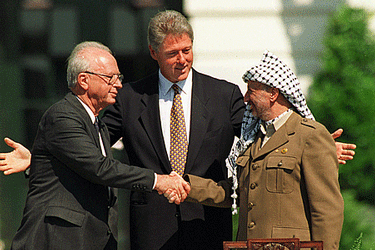
Negotiations for the Oslo Accords, known officially as the Declaration of Principles on Interim Self-Government Arrangements, were held in secret in Oslo, and signed in Washington in the presence of President Bill Clinton, Israeli Prime Minister Yitzhak Rabin and PLO Chairman Yasser Arafat.
The Accords were intended to be temporary, lasting for an interim period of five years during which final status agreements would be reached on borders, Palestinian refugees, Jerusalem, Israeli settlements and security.
The agreement provided for interim Palestinian self-government in the Gaza Strip and the West Bank, under a Palestinian Authority, but fell short of promising full Palestinian statehood.